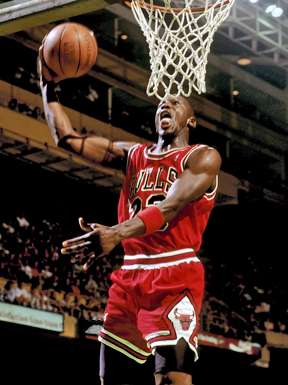Shooting guard

The shooting guard (SG), also known as the two or off guard,[1] is one of the five positions in a regulation basketball game. A shooting guard's main objective is to score points for his team.[1] Some teams ask their shooting guards to bring up the ball as well; these players are known colloquially as combo guards. Kobe Bryant, for example, as a shooting guard was as good a playmaker as he was a scorer; other examples of combo guards are Dwyane Wade, Allen Iverson, James Harden, Jamal Crawford, Randy Foye and Jason Terry. A player who can switch between playing shooting guard and small forward is known as a swingman. Notable swing men (also known as wing players) include Jimmy Butler, Tracy McGrady, Vince Carter, Joe Johnson, Andre Iguodala, Andrew Wiggins, Evan Turner and Tyreke Evans. In the NBA, shooting guards usually range from 6' 4" (1.93 m) to 6' 7" (2.01 m).
Characteristics and styles of play
The Basketball Handbook by Lee Rose describes a shooting guard as someone whose primary role is to score points. As the name suggests, most shooting guards are good long-range shooters, typically averaging 35–40 percent from three-point range (Ray Allen, Reggie Miller, Kyle Korver, Klay Thompson, and Dell Curry are good examples of elite shooters). Many shooting guards are also strong and athletic, and have the ability to get inside the paint and drive to the basket, five extraordinary examples are the players Michael Jordan, Kobe Bryant, Dwyane Wade, Tracy McGrady, and Vince Carter.
Typically, shooting guards are taller than point guards. Height at the position varies; many bigger shooting guards also play small forward. Shooting guards should be good ball handlers and be able to pass reasonably well, though passing is not their main priority. Since good shooting guards may attract double-teams, they are frequently the team's back-up ball handlers to the point guard and typically get a fair number of assists.
Shooting guards must be able to score in various ways, especially late in a close game when defenses are tighter. They need to have a good free throw percentage too, to be reliable in close games and to discourage opposing players from fouling. Because of the high level of offensive skills shooting guards need, they are often a team's primary scoring option, and sometimes the offense is built around them.
Good shooting guards can usually play point guard to a certain extent. It is usually accepted that point guards should have the ball in their hands at most times in the game, but sometimes the shooting guard has a significant enough influence on the team where he or she handles the ball extremely often, to the point where the point guard may be reduced to a backup ball handler or spot-up shooter.
Notes
- 1 2 Shooting guards are 6'3"–6'7". BBC Sports academy. URL last accessed 2006-09-09.
References
- The Basketball Handbook (pg 15) (2004). Lee H. Rose ISBN 0-7360-4906-1
External links
![]() Media related to Shooting guards at Wikimedia Commons
Media related to Shooting guards at Wikimedia Commons
